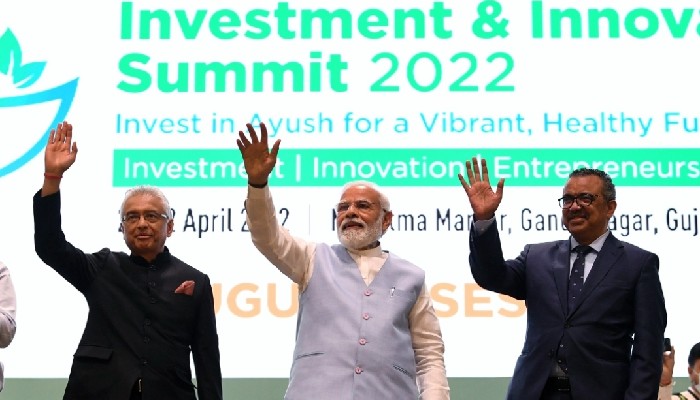Telling good stories to children should be a part of public life, Prime Minister Narendra Modi said
“Where there is a soul, there is a story,” Prime Minister Narendra Modi said, urging people to take out some time in the family every week for stories while addressing the nation through 16th edition of ‘Mann ki Baat 2.0’. He hailed the storytellers who are keeping the traditional artform alive through various initiatives.
Storytelling has been an integral part of India’s history and tradition and can play a vital role in bringing families together during COVID-19 when people are forced to spend most of their time indoors, PM Modi said during his ‘Mann ki Baat 2.0.’
Referring to COVID-19 pandemic, he said, “During these Corona times, the world has seen many changes but these times have brought families together. However, living together for such a period of time posed many challenges to the families due to the lack of storytelling.”
Our tradition which was followed as code of sacraments in the families is lost now. In almost all the families, elderly people used to tell stories to the younger generation to cheer them up, PM Modi said while addressing the nation. Stories bring out the creative and sensitive aspects of human beings, he said.
Taking cues from his own experiences, PM Modi said, “I have been a wandering ascetic in my life for a very long time. Travelling was my life. Everyday a new village, new people, new families, but when I used to visit families, I used to talk to children and sometimes asked children to tell me a story. I was astonished, the children used to say, no uncle, not story, we will tell a joke. They used to ask me to tell a joke. It means that they had no introduction to storytelling.”
He said, with storybooks such as ‘Hitopadesha’ and ‘Panchatantra’ very well prevalent in India, storytelling is ingrained in the Indian culture and society.
Giving examples of people who have successfully made a profession out of storytelling, he urged the nation to help them in their cause of keeping the art of storytelling alive.
He said, “There are many endeavours that are popularising stories from rural India. People like Vaishali Vyawahare Deshpande are making this form popular in Marathi.”
The others include founder of Gathastory.in, Amar Vyas who lives in Bengaluru and takes time out to pursue storytelling. Similarly, he said, Srividya Veer Raghavan of Chennai is also engaged in popularizing and disseminating stories related to our culture, while two websites named, Kathalaya and The Indian Story Telling Network, are also doing commendable work in this field.
He also referred to Vikram Sridhar in Bengaluru who tells stories related to Bapu (Mahatma Gandhi).
“Many more such people must be working in this field. You must share about them on social media,” PM Modi said.
PM Modi interacted with renowned storytellers from Bengaluru Storytelling Society including Aparna Athare and other members. Interestingly, the group also recited a story of ‘Tenali Rama’ to him.
PM Modi said, “I urge storytellers like you and other people to find ways to connect the new generation of our country with lives of great men and women through stories; we should also think of ways to publicise the art of storytelling, popularise it in every home specially with good stories for children.... Telling good stories to children should be a part of public life. We should work together in that direction, in creating that atmosphere.”
Indian storytelling has left a deep impact in the world, PM Modi’s Mann ki Baat’s 16th edition established the fact.
PM Modi referred to Sedu Dembele from Mali who is known as ‘Hindustani Babu’ in Mali for presenting Bollywood songs during his weekly radio programme named as ‘Indian frequency on Bollywood songs!’ He has been presenting the programme for the last 23 years.
Clearing the air on farmers’ issues, PM Modi said that the agricultural sector and farmers have played a significant role in India’s ‘Atmanirbhar Bharat Abhiyan.’
He said, “Even in this time of crisis, the agricultural sector of our country has again shown its resilience. Friends, the agricultural sector of the country, our farmers, our villages are the very basis of Atmanirbhar Bharat, a self-reliant India. If they remain strong then the foundation of Atmanirbhar Bharat will remain strong.”
Saying that the reforms in APMC act has reformed the agricultural sector, he said that excluding fruits and vegetables from the APMC act has benefitted many farmers.
Giving an example of Haryana farmer Kanwar Chauhan, PM Modi said, “There was a time when he used to face great difficulties in marketing his fruits and vegetables outside the mandi, the market place. If he used to sell his fruits and vegetables outside the mandi, then, many times his produce and carts would get confiscated. But, in 2014, fruits and vegetables were excluded from the APMC Act, which greatly benefited him and fellow farmers in the neighbourhood.”
“They have the power to sell their fruits and vegetables, anywhere and to anyone! And this power is the foundation of their progress. Now this power has also been imparted to other farmers of the country not only for marketing of the fruits and vegetables but whatever they are producing or cultivating in their fields, - paddy, wheat, mustard, sugarcane, whatever they are growing they have now got the freedom to sell where they can get a higher price according to their wish,” PM Modi said.
Similar examples were seen in the states of Maharashtra and Tamil Nadu, PM Modi said.
 Contact Us
Contact Us  Subscribe Us
Subscribe Us









 Contact Us
Contact Us
 Subscribe
Subscribe
 News Letter
News Letter

